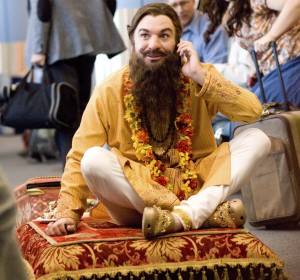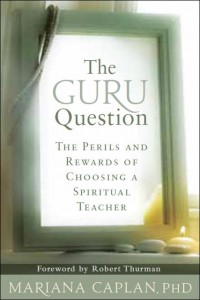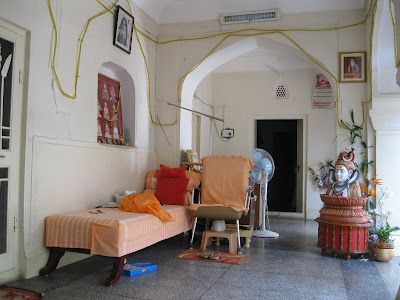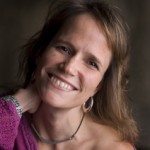
An electronic diary sharing my spiritual path through observations/experiences, photos, videos, articles and more. It started with intensity at the end of January 2011 when I decided to go to South Africa and see the truth of animals living in the wild. Unsatisfied with the answers, I went to India looking for the truth of humans in an ancient civilization. Packing up my life as a dressage trainer in Southern California, I moved to Jaipur, India to follow a spiritual inquiry.
Monday, May 30, 2011
Saki Bowl

Sunday, May 29, 2011
Soaking in the vibration of sound
Friday, May 27, 2011
Thank you Yo-yo

After posting my friend's dog's death, I found out that Yo-yo, the little puppy at the Pahari Baba Ashram, died of poisoning. I had just emailed inquiring into how his leg was healing when I got the news. Whether or not you believe death is final or a transition, it does punctuate a moment in the flow of what we experience as living presence. For me, it led me to a place of reflection: how was I touched by that small,four-legged, ball of energy? He helped me to rekindle my animal heart and feel its place in the bigger presence of Gurudev, the ashram's energy field, and the infinite. He led me to the vet hospital and an experience with the animal care giving services in Jaipur. He showed me how Gurudev, "Nature" Baba, and a disciple worked together to support a healing opportunity for his leg. And on a very personal note, he always greeted me with his wagging tail and puppy eyes while I made the transition from walking, to taking my shoes/socks off, and heading into meditate. He was often in the shoe area or out front for the send off too. Such gratitude for his heart opening presence and the power in the silence of his teachings.
Tuesday, May 24, 2011
Madison

Animals have been my family. I couldn't pass up sharing this beautiful picture of a beloved dog, Madison, who has transferred his soul to a passing hummingbird. I didn't get to meet Madison, but there is such truth and beauty in his expression that it has touched me as deeply as many other mystical experiences. Thank you for sharing Liz.
Lesson opportunities from the western world
Saturday, May 21, 2011
Satsang In Temecula, California





First satsang post India. I went to a gathering of seekers at Francis Lucille's house in Temecula, California. The house was on top of a mountain that overlooked the world at large. It wasn't too different than being on the wall at Amber Fort or the Ganesha temple. The more I travel, the more similarities I experience in the world. It is no different than seeing a full moon and reflecting upon where you have experienced different moons. With the current full moon, I was remembering South Africa and India and how the moon has the same beauty everywhere. A few days ago, I drove by a lake in Escondido and missed seeing the floating palace that is in Jaipur's lake.
Friday, May 20, 2011
Lady Gaga's 3 year rise to Global fame
Tuesday, May 17, 2011
The newest layer unfolding
The guru concept
Is Guru a 4-Letter Word? by Mariana Caplan
 The can of worms is open. Opening up the question on my last blog of “How To Find a Spiritual Teacher,” or whether we need a teacher at all, tends to incite even the most dormant of creatures. We have strong reactions, powerful opinions and oftentimes righteous convictions regarding this topic, as was seen from the many and varied, but never lukewarm responses to my last post. In fact, when I toured an early version of my book in 2002, there were two uprisings in bookstores where I spoke — one in Manhattan and the other in Barcelona. In both cases, the movement was to incite the crowd to see that spiritual authority comes from within! I have absolutely no problem with this approach, nor with those who deeply feel the need for a teacher, or those who are confused, but why so much energy?
The can of worms is open. Opening up the question on my last blog of “How To Find a Spiritual Teacher,” or whether we need a teacher at all, tends to incite even the most dormant of creatures. We have strong reactions, powerful opinions and oftentimes righteous convictions regarding this topic, as was seen from the many and varied, but never lukewarm responses to my last post. In fact, when I toured an early version of my book in 2002, there were two uprisings in bookstores where I spoke — one in Manhattan and the other in Barcelona. In both cases, the movement was to incite the crowd to see that spiritual authority comes from within! I have absolutely no problem with this approach, nor with those who deeply feel the need for a teacher, or those who are confused, but why so much energy?
Is Guru a 4-Letter Word?
I have spent time with gurus who are living proof that “guru” can be a four-letter word. Nobody has asked me to drink cyanide-laced Kool-Aid, but I have been offered plenty of other substances. And most of the other crimes of power and passion one hears about in relation to purported gurus have been perpetrated upon me and people I know. After 17 years of experience on four continents and 10 years of research in the field, I am both personally and professionally all too familiar with the kinds of shocking abuses of power that have been committed in the name of spirituality. Yet I cannot denounce spiritual teachers in general, any more than I can denounce all men simply because I have had some less than desirable lovers.
I have learned that when one writes or speaks publicly on this topic, four potential positions can be expected: 1) The strong assertion that the guru and the source of all spiritual authority comes from within, and that people who seek from without are essentially deluded. This group speaks the loudest and the strongest, usually with a slight edge of disdain towards those who have or want teachers; 2) The people who have a particular guru and not only think that the Guru Road is the only destination in town, but more specifically that their guru’s home is the center of the universe. They want the world to join their guru’s mission because they sincerely believe that the world would be a better place if this was so; 3) One step down from this are those who believe that we need a teacher, but that it need not be their teacher. This group is less likely to proselytize their perspective; 4) Those who are either questioning whether they need a teacher, or are looking for a teacher but cannot locate one — this group is humble, open, curious.
Not Always So
If there is anything I have learned over 20 years of study, practice and research on the spiritual path, it is the truth of the teaching propagated by Zen master Shunru Suzuki of “not always so.” There is not one clear-cut road of beliefs and practices to suit all human beings. There are well-trodden paths and religions that have proven to be helpful to many people in indescribable and irreplaceable ways. Yet whether we practice in one of these traditions or find our unique path through the labyrinth of life, we each walk the path differently, in a way that only the inimitability of each of our beings can do — our “unique self.”
I now understand that there are as many unique paths to spiritual unfolding as there are human beings. I remember when Llewellyn Vaughan-Lee, my Sufi “uncle,” and Huff Po blogger, told me this. I was a die hard seeker in my twenties. Although in theory it made sense, inside I secretly believed, “But my path is the best path, or at least one of the very best, and there is a best way to follow my path.” Now, almost two decades later, it is clear to me that each human being follows a unique trajectory in relationship to spirit, truth or God.
The Need for Discernment on the Spiritual Path
Spiritual discernment, called viveka khyātir in Sanskrit, is said to be the “crowning wisdom” on the spiritual path.
The Yoga Sūtras of Patañjali say that the cultivation of discernment is so powerful that it has the capacity to destroy ignorance and address the very source of suffering. According to Merriam-Webster’s Collegiate Dictionary, to discern is “to recognize or identify as separate and distinct.” Discrimination, its synonym, “stresses the power to distinguish and select what is true or appropriate or excellent.” Those who possess spiritual discernment have learned this skill in relationship to spiritual matters, and they can consistently make intelligent, balanced and excellent choices in their lives and in relationship to their spiritual development. Their eyes are wide open and they see clearly.
Viveka khyātir is believed to be such a powerful tool that it has the capacity to pierce all levels of the physical, psychological, energetic and subtle bodies of the human being. In “Light on the Yoga Sūtras of Patanjali,” B. K. S. Iyengar explains that through this unbroken flow of discriminating awareness, the spiritual practitioner “conquers his body, controls his energy, retrains the movements of the mind, and develops sound judgment, from which he acts rightly and becomes luminous. From this luminosity he develops total awareness of the very core of his being, achieves supreme knowledge and surrenders his self to the Supreme Soul.”
I believe that more potent than any of our current spiritual convictions — which if we observe closely and honestly within ourselves over many years, we discover, do in fact change no matter how certain we were of what we believed — is the capacity for discernment. The degree to which our discernment is refined is the extent to which we can move through the complexities of the spiritual marketplace and the deepening of spiritual life with effectiveness and wisdom. We make radiant choices that serve others in smaller and larger ways, and become part of the evolutionary and healing force in life, instead of what George Bernard Shaw calls, “a feverish, selfish little clod of ailments and grievances complaining that the world will not devote itself to making me happy.”
Do You Need a Spiritual Teacher?
Is there a point in one’s spiritual journey when reading books or hearing lectures isn’t enough and the student hungers for a teacher, in the flesh, to learn from directly? In  a culture where a distrust of authority is considered a healthy trait, Americans tend to be justifiably suspicious of gurus and spiritual leaders. How do you find a teacher worthy of trust and devotion, or should you?
a culture where a distrust of authority is considered a healthy trait, Americans tend to be justifiably suspicious of gurus and spiritual leaders. How do you find a teacher worthy of trust and devotion, or should you?
The Guru Question: The Perils and Rewards of Choosing a Spiritual Teacher (Sounds True, June 2011) is a new book by Mariana Caplan that offers advice on what to look for—and what to avoid—when seeking a dedicated spiritual teacher. The book includes a foreword by Robert Thurman.
Drawing upon her knowledge as both a scholar of mysticism and lifelong practitioner of spiritual traditions, Caplan delivers a candid, practical, and daringly personal examination of the student-teacher dynamic, featuring:
- Are you ready to be a student? If and when you should consider making a commitment to a spiritual teacher
- The path of the conscious learner—how to retain your power and autonomy while accepting a mentor’s authority
- Spiritual scandals and predatory gurus—tips for avoiding the inherent pitfalls in the student-teacher relationship
- The true source of power—how to recognize the inner light of divinity as it manifests in the imperfect human guise of your teacher and yourself
With The Guru Question, Mariana Caplan helps readers develop the discernment that is crucial when seeking a teacher—and reveals the immeasurable rewards that can come from having a trustworthy guide on the spiritual path.
Friday, May 13, 2011
Animal guides
Tuesday, May 10, 2011
Sophie


Sunday, May 8, 2011
Light into dark


Meditation in nature
Friday, May 6, 2011
All oars in the water.
Thursday, May 5, 2011
The heart journey continues
Tuesday, May 3, 2011
Final flight
Monday, May 2, 2011
Global Sharing
Sunday, May 1, 2011
A day in South Africa


South Africa for a day, one step closer to home. Although, I am feeling like home is inside of me now and that it doesn't matter where my body is, it just a skin sack with bones inside to give it some shape. I can see the benefits of India's lifestyle for this thinking. They are more connected to the spirit (abstract) than the form (concrete.) And the West is opposite. Wow, this is too cool integrating all of it back together. What a gift learning how to be comfortably present in both environments. I picked up two books at the airport: one is about Gandhi and his process in South Africa/India and the other is Eat, Pray, and Love, ( a book about a Western woman's spiritual search through Italy, India, and Indonesia.)




